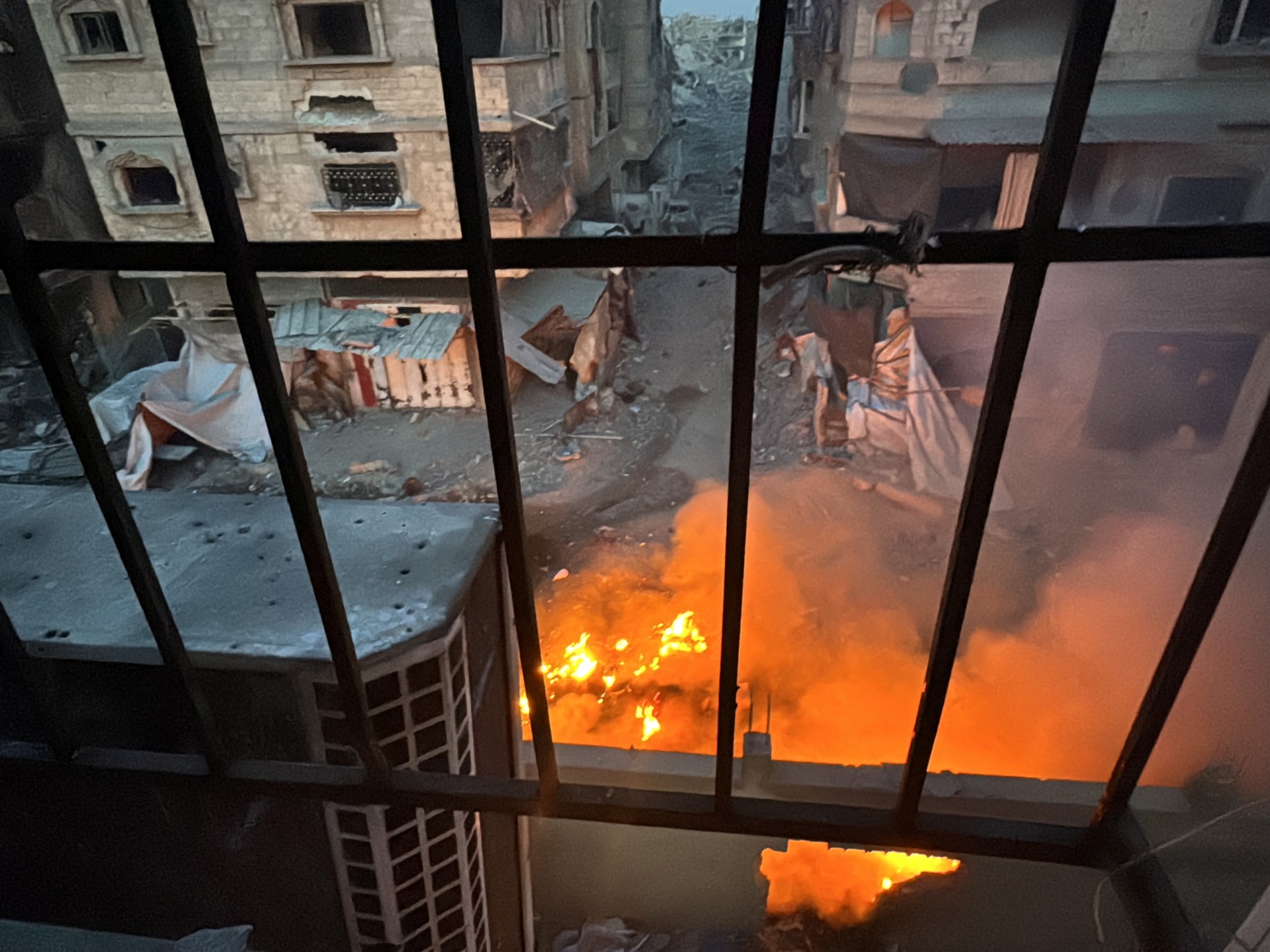This morning, I opened social media sites to search for news about Gaza. I had to scroll through my newsfeed for a while before I saw the first mention of my homeland.
However, the news we receive from Gaza through friends, family and social media is no less bleak than it was a year ago. Its people continue to scream for help, hoping the world will hear them.
For three months, Dr. Hossam Abu Safiya, director of Kamal Adwan Hospital in Beit Lahia, north of Gaza, sent distress calls to the world, while the Israeli army besieged the hospital, cut off its supplies, bombed it, and slaughtered people in its vicinity. Some medical staff and patients inside were injured.
In a video appeal posted on December 12, Dr. Abu Safiya lamented: “We are now without any capacity and providing low-level service. I hope there will be listening ears. We hope that there will be a living conscience that will hear our appeal and facilitate a humanitarian corridor to the hospital so that Kamal Adwan Hospital can continue its work in providing services.”
But his cries for help fell on deaf ears. The day after Christmas, Israeli bombing killed a woman at the front gate of the hospital and five medical workers: Dr. Ahmed Samour, a pediatrician; Israa Abu Ziadeh, laboratory technician; Abdul Majeed Abu Al-Eish and Maher Al-Ajrami, paramedics; And Faris Al-Hodli, maintenance technician. The shrapnel shattered the skull of nurse Hassan Dabbous inside the hospital, endangering his life.
Yesterday, Israeli soldiers stormed the hospital, set it on fire, expelled 350 patients, and kidnapped Dr. Abu Safiya and other medical staff.
This shocking news barely received international media coverage; There were no reactions from foreign governments or leading institutions, except for a few Middle Eastern countries and the World Health Organization. It is clear that Israel has succeeded in normalizing its brutal attacks, destroying Palestinian hospitals, and killing Palestinian patients and medical staff.
Nor was there any reaction from the world when earlier this month Dr. Saeed Jodeh, the last remaining orthopedic surgeon in northern Gaza, was assassinated on his way to work at the barely functioning Al Awda Hospital in the Jabalia refugee camp. Dr. Judeh was a retired surgeon who felt forced to return to work due to a severe shortage of doctors due to targeted killings carried out by Israel.
Just one week before his killing, he learned that his son Majd had been killed. Despite his grief, Dr. Gouda continued his work.
Israel seeks to eliminate all aspects of civilian life in northern Gaza as part of its depopulation policy. For this reason, it targets civilian infrastructure throughout the North and impedes its functioning. The few medical facilities were the last vestiges of civilian life.
Aside from trying to exterminate medical workers, the Israeli army also systematically prevents civil defense teams and ambulances from saving lives in the north, often beating and killing them when they try to do so.
It is not only the North’s calls that are being ignored.
The entire Gaza has suffered from famine as Israel has dramatically reduced the number of humanitarian and commercial trucks entering the Gaza Strip. Hunger is everywhere and affects even those who may have some means to buy food but cannot find it.
My cousin, who works as a teacher with UNRWA, recently told me about his visit to his sister, who was sick and displaced in Deir al-Balah. During his visit, he could not sleep. He did not eat bread for 15 days, but his extreme hunger as a diabetic was not what kept him alive. It was the cries of his sister’s children who begged for just a piece of bread. In a desperate attempt to calm them down, my cousin told them story after story until they fell asleep. But he stayed awake, haunted by their hunger and his own.
Aside from food, Israel is also preventing the delivery of much-needed materials to build shelters. Four children have frozen to death since the beginning of this month.
Amid famine and a harsh winter, the Israeli bombing of the homes and tents of displaced people did not stop.
On December 7, a distant relative, Dr. Muhammad al-Nayrab, lost his wife and three daughters when the Israeli army struck their home in the Sheikh Radwan neighborhood, west of Gaza City. Two of his daughters, Sally and Sahar, were doctors who helped save lives. They can’t anymore.
When my niece, Nour, a mother of two, reached out to her uncle, Dr. Mohammed, to offer her condolences, she found the pain of losing him unbearable. I spoke to her shortly after. Her words pierced despair like a scream: “When will the world hear us and see us? When will these massacres matter? Are we not human?
On December 11, another family was injured near Dr. Muhammad’s house in the Sheikh Radwan neighborhood. This Israeli attack led to the killing of Palestinian journalist Iman Al-Shanti, along with her husband and three children.
Days before her murder, Iman shared a video of herself contemplating the reality of genocide. “Is it possible that this level of failure exists? Is the blood of the people of Gaza so cheap for you?” I asked the scientist.
There was no answer. Just as war crimes against Palestinians were normalized, so too was Palestinian death and pain. This normalization not only silences their suffering, but also denies their humanity.
However, for Palestinians, the pain of loss is not at all normal – it lingers, burrows into the soul, raw and unrelenting, carried by the echoes of those lost, inside and outside Gaza. It is a transnational pain, a grief that crosses borders and challenges borders, connecting Palestinians in exile to those suffering the horrors of genocide.
In a social media post on December 3, journalist Diana Al-Mughrabi, currently displaced in Egypt, captured the never-ending grief of the people of Gaza: “Our loved ones do not die once, they die many times after their actual death. A person died the day he died, Then he died again on the day his watch, which I had kept on my wrist for years, broke. He died again when the tea cup he was drinking from broke. That person died again on the day that reminds us of the actual date of his death, and after his burial, When the coffee residue was washed from his last cup, and when I saw someone collecting the rest of his medicine to dispose of it, those we love continue to die many times – they never stop dying – not for a single day.
Although death has been repeated more than 45,000 times, the world seems ready to move on from Gaza. Fifteen months after this genocide, advocates and activists around the world feel devastated and exhausted by the endless destruction in Gaza and the overwhelming silence and acceptance of it.
As an indigenous Palestinian and third-generation Palestinian refugee, despite the indelible marks on the soul of genocide – marks that time cannot erase – I refuse to lose hope. I remember here the words of the Czech dissident Vaclav Havel: “Hope is certainly not the same as optimism. It is not the conviction that something will turn out well, but the certainty that something makes sense, regardless of how it turns out.
South Africa’s case against apartheid at the International Court of Justice and the work of the International Criminal Court are not only significant – they are crucial in establishing Israel as a pariah state, one among those that have sought to eradicate entire peoples. The world must not forget Gaza. Now, more than ever, her cries must be heard and her call for justice answered.
The opinions expressed in this article are those of the author and do not necessarily reflect the editorial position of Al Jazeera.




